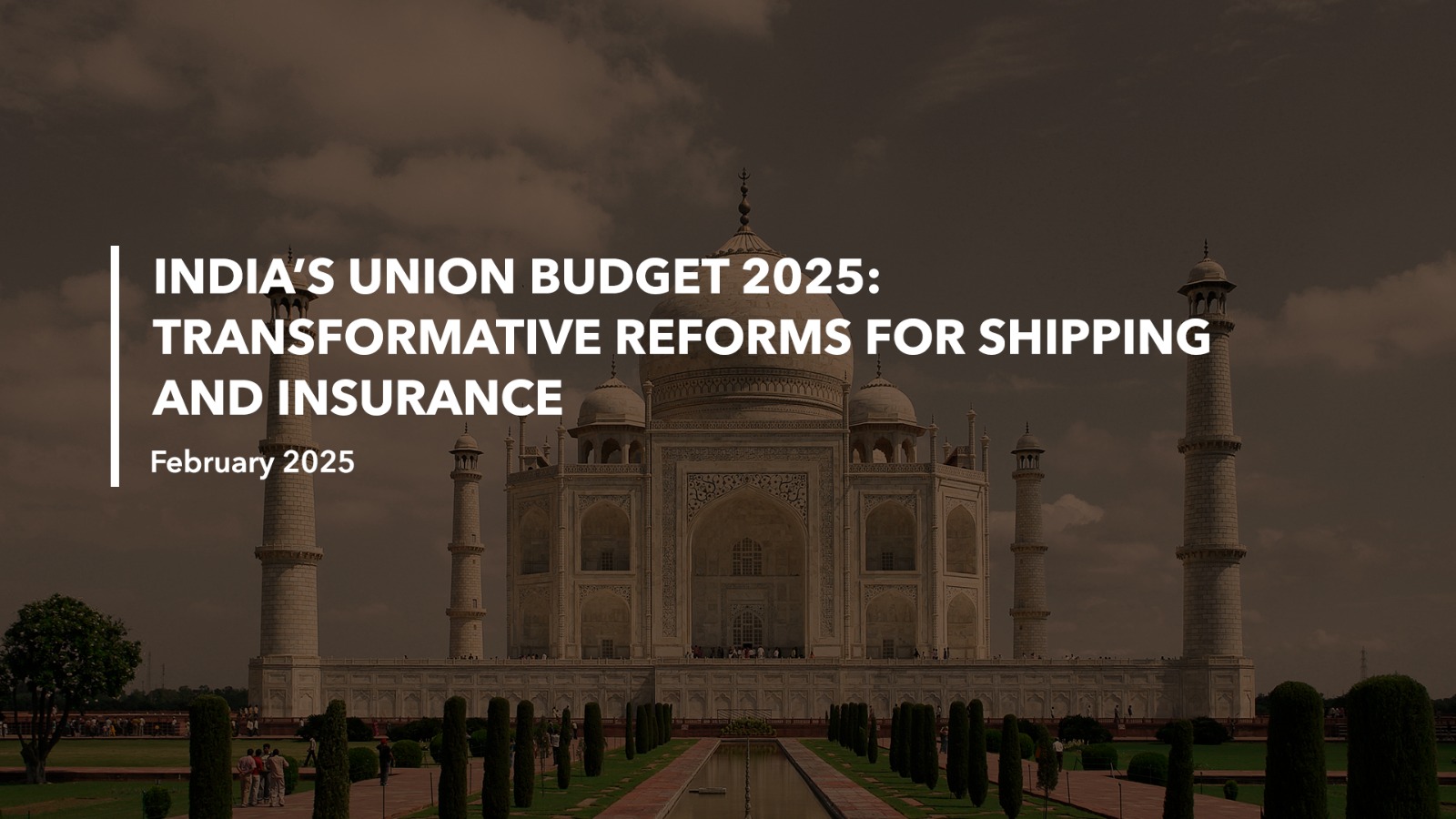On 1 February 2025, Nirmala Sitharam, India’s Finance Minister presented the Union Budget for 2025- 2026 in the Lok Sabha, which is the lower house of the Parliament of India. The transcript for the entire speech can be accessed here.
The Union Budget 2025 heralds a new era for India’s shipping and insurance industries, introducing groundbreaking measures for the country’s maritime and insurance sectors. With a clear vision for global competitiveness, the government has announced five pivotal reforms that could redefine India’s standing in these industries.
Key Takeaways
1. Revamped Shipbuilding Financial Assistance Policy
To counterbalance cost disadvantages in domestic shipbuilding, the government has introduced credit notes as an incentive for shipbuilding within Indian yards. This move is set to encourage a circular economy, reduce dependency on imports, and bolster the local shipbuilding ecosystem.1 By fostering indigenous manufacturing, India aims to position itself as a serious contender in the global shipbuilding market.
2. Enhanced Financing for Large Ships
Ships above a prescribed size will now be included in the harmonized master list for infrastructure sectors, 2 significantly improving their access to external commercial borrowings (ECBs) and other financing avenues. This measure aligns with India’s long-term maritime strategy, enabling greater capital influx into the sector and hopefully enabling expansion in deep-sea vessel capacity.
3. Establishment of Shipbuilding Clusters
Recognizing the need for an integrated approach, the budget earmarks investments for shipbuilding clusters designed to strengthen the maritime ecosystem. 3 These clusters will drive infrastructure development, workforce skilling, and technology enhancement, thereby expanding India’s capabilities in constructing a broader range of vessels.
4. INR 25,000 Crore Maritime Development Fund (MDF)
A monumental initiative, the MDF is structured as a long-term financing corpus for the maritime sector. The fund will receive a 49% contribution from the government, with the remainder sourced from ports and private stakeholders. 4 This injection of capital is expected to fuel expansion, innovation, and modernization, ensuring that India keeps pace with global maritime developments.
5. 100% FDI in Insurance
In a move that could be a game-changer for the financial sector, the budget has increased foreign direct investment (FDI) limits in insurance to 100%.5 This reform eliminates the mandatory requirement for domestic partners, allowing foreign insurers to establish wholly owned subsidiaries in India. The policy is poised to drive greater competition, innovation, and consumer choice.
Implications for the ASEAN Region and Beyond
1. Opportunities for Shipbuilders, Shipyards, and Insurers in South-East Asia
India’s ambitious maritime vision signals significant opportunities for regional and global players. The strengthened shipbuilding sector, backed by financial incentives and cluster development, invites collaboration with foreign entities in technology sharing and expertise exchange. Shipbuilders and maritime companies in South-East Asia stand to benefit from India’s push for local manufacturing, creating avenues for collaborations through supply of equipment, sharing of technology, training ventures, amongst other opportunities.
2. Expanding Market Access for Insurers
The removal of barriers to entry in the insurance sector allows foreign corporations to establish an independent presence in India. This fosters a more dynamic and competitive market, providing global insurers with direct access to one of the world’s fastest-growing economies.
3. India’s Maritime Aspirations: 2047 and Beyond
The long-term objective remains ambitious: positioning India among the top five shipbuilding nations by 2047. With substantial financial backing, a strategic push for domestic manufacturing, and a commitment to regulatory reforms, the trajectory appears promising. However, execution will be key.
Our Perspective
These developments signal opportunities ahead for our shipping expertise and our India Desk practice at PDLegal, which plays a pivotal role in bridging gaps and facilitating collaborations between India and South-East Asia. As India refines its shipping and insurance policies, our firm is well-placed to facilitate cross-border collaborations, investments, and regulatory navigation for stakeholders seeking to leverage these opportunities.
The future of India’s maritime and insurance sectors has never looked more promising. As these reforms take shape, the global industry watches closely, anticipating India’s ascent in the maritime and financial landscapes.
© PDLegal LLC
This article is intended to provide general information only and does not constitute legal advice. It should not be used as a substitute for professional legal consultation. We recommend seeking legal advice before making any decisions based on the information available in this article. PDLegal fully disclaims responsibility for any loss or damage which may result from relying on this article.
Further information
Should you have any questions on how this development may affect you or your business, please get in touch with the following person:

